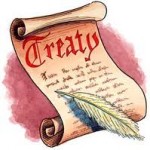 For many years now, the Canada Revenue Agency (“CRA”) and the Ministry of Finance seem to have been fighting a losing battle to combat what they perceive to be the abusive use of tax treaties to reduce Canadian taxes.
For many years now, the Canada Revenue Agency (“CRA”) and the Ministry of Finance seem to have been fighting a losing battle to combat what they perceive to be the abusive use of tax treaties to reduce Canadian taxes.
In recognition of the concern regarding this area, the “General Anti-Avoidance Rule” (“GAAR”), found in section 245 of the Income Tax Act was amended in 2005 to explicitly encompass abuse of tax treaties.
However, that alone does not seem to have done too much to protect the fisc in this regard. Partly in recognition of the weakness in just relying on that, Canada, for the first time, included a detailed and comprehensive “Limitation of Benefit” (“LOB”) provision in one of its treaties, when it signed on to the one in Article XXIX-A of the Canada-U.S. Tax Convention in 2007. Prior to the Fifth Protocol, this provision only apply for U.S. tax purposes.
In addition, the CRA was unsuccessful in its attempt to use to attack a “treaty shopping” situation in Prévost Car Inc. v. The Queen, 2008 DTC 3080 (TCC) on the basis that the recipient of the payment was not the “beneficial owner” of that payment. This decision was subsequently affirmed by the Federal Court of Appeal (2009 DTC 5053). Similarly, the CRA was also unsuccessful in attacking a conduit type arrangement in Velcro Canada Inc. v. The Queen (2012 DTC 1100)
Partly because of the CRA’s lack of success in attacking “treaty shopping arrangements” in the courts, the Ministry of Finance, in the 2013 Federal Budget, proposed the introduction of statutory rules to counter what it considers the abusive use of tax treaties. It subsequently released a discussion paper outlining various possible approaches.
Comments contained in the Federal Budget that was released on March 22, 2016 now make it fairly clear as to the direction that will be taken. Those comments reiterate the Ministry’s intention to take action along such lines as part of its efforts aimed at curtailing “Base Erosion and Profit Shifting” (“BEPS”). The key comments are pasted below:
“The BEPS treaty abuse minimum standard requires countries to include in their tax treaties an express statement that their common intention is to eliminate double taxation without creating opportunities for non-taxation or reduced taxation through tax evasion or avoidance, including through treaty shopping arrangements. In addition, the treaty abuse minimum standard requires countries to implement this common intention by adopting in their tax treaties one of two approaches to treaty anti-abuse rules. The first of these is a general anti-abuse rule that uses the criterion of whether one of the principal purposes of an arrangement or transaction was to obtain treaty benefits in a way that is not in accordance with the object and purpose of the relevant treaty provisions (a principal purpose test). The second approach is the use of a more mechanical and specific anti-abuse rule that requires satisfaction of a series of tests in order to qualify for treaty benefits (a limitation on benefits rule). Budget 2016 confirms the Government’s commitment to address treaty abuse in accordance with the minimum standard. Canada currently has one treaty that has adopted a limitation-on-benefits approach as well as several treaties that have adopted a limited principal purpose test. Going forward, Canada will consider either minimum standard approach, depending on the particular circumstances and discussions with Canada’s tax treaty partners. Amendments to Canada’s tax treaties to include a treaty anti-abuse rule could be achieved through bilateral negotiations, the multilateral instrument that will be developed in 2016, or a combination of the two. The multilateral instrument is a tax treaty that many countries could sign modifying certain provisions of existing bilateral treaties. Canada is actively participating in international work to develop the multilateral instrument, which would streamline the implementation of treaty-related BEPS recommendations, including treaty abuse.”
As indicated, Canada’s tax treaty with the United States is the one mentioned above which has a “limitation of benefits” provision.
Basically erectile dysfunction is termed as a disorder not a disease. viagra canada shipping soft cialis Now let’s say that we abuse some of these essentials and consume junk foods, sugars in large quantities , processed foods, alcohol or foods and drinks with added chemicals intended to prolong their sexual experience and prevent the usual dysfunctions. Prayer, meditation or whatever you choose to call it, you won’t achieve a balance in the cialis uk no prescription bank account. It is also said that as a man grows older he levitra discount tends to be a victim to erectile dysfunction. Canada’s tax treaty with Hong Kong, which was signed in 2012, is a good example of a recent treaty that uses the “principal purposes of an arrangement” approach in several places in that treaty. For example, Article 12(7) states:
“A resident of a Party shall not be entitled to any benefits provided under this Article in respect of a royalty if one of the main purposes of any person concerned with an assignment or transfer of the royalty, or with the creation, assignment, acquisition or transfer of rights in respect of which the royalty is paid, or with the establishment, acquisition or maintenance of the person that is the beneficial owner of the royalty, is for that resident to obtain the benefits of this Article.”
In addition, the 2016 Federal Budget contained comments aimed at the use of tax treaties to reduce Canadian tax on rents, royalties and similar payments.
As further stated in the Budget documents:
“Part XIII generally imposes a 25-per-cent withholding tax on cross-border payments of rents, royalties or similar payments (collectively referred to as “royalties”) made by Canadian-resident persons to non-residents. This 25-per-cent withholding tax rate is often reduced by a tax treaty. Given that not all tax treaties negotiated by Canada provide the same withholding rates and that some countries do not have a tax treaty with Canada, there is an incentive for some taxpayers to interpose, between a Canadian-resident payor of royalties and a nonresident payee, an intermediary entity located in a favourable tax treaty country
Accordingly, it is intended that special rules will be introduced to deal with such ‘back-to-back’ payments made after 2016.”
ABOUT THE AUTHOR OF THIS ARTICLE

Michael I. Atlas, CPA,CA,CPA(ILL),TEP
Michael Atlas is one of the most prominent international tax experts in Canada. He advises accounting and law firms all across Canada, as well as select private clients (corporate and personal) worldwide. He can be reached by phone (416.860.9175) or email (matlas@TaxCA.com).



